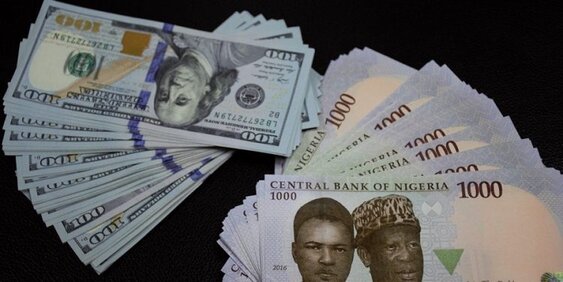The Nigerian Naira is one of the worst-performing currencies in Africa, no thanks to the parasitic leadership who has no economic direction.
Even as foreign investors continue to pull out of the Nigerian stock market, those at the helm of affairs continue to bank on speculative data that do not reflect the reality of hardship on the streets.
At the time of this report, the official CBN USD exchange rate was pegged at NGN416.39; it’s NGN567.0815 against the Great British Pound and NGN472.561 for Euro. The black market or parallel market is a no go area.
For instance, 1USD was between NGN569 to NGN575 on Monday, February 21, 2022, as against when Nigeria was on top of its game in 1984.
That was when the Nigerian naira was more valuable than the US dollar, 1USD was just NGN0.765. The incumbent president, Muhammadu Buhari was in charge.
Though there was a slight margin in the exchange rate when he kicked a democratically elected government out of government.
When he took over on December 31, 1983, $1 was N0.724. It dropped to N0.894 against 1USD. Economic analysts at the time complained, they never knew the worst was in the offing.
Nobody knew that the naira would one day become one the worst currencies in Africa and one of the poorest against its competitors in the 1970s.
Fast forward:
Ever since 1972, the naira has never made any significant gain against its competitor in the forex market.
Data on CBN exchange rate from 1972 till date do not look like the naira can ever have the 1970s value it had against the US dollar. At least, not in the next 100 years with the current leadership.
Each time I see reports that the naira gained in the forex market, I knew we were only celebrating the rate of the weakness against USD, GBP and EURO, nothing significant.
Effect of weaker Naira
Weaker naira means that exports from Nigeria are much more attractive, the country has continued to import inflation including fuel which should have been its comparative advantage in the global economy.
Unfortunately, crude has been a curse as the political class and their allies continue to feed fat thereby contributing to all sorts of social vices.
A hit on the Nigerian stock market
While the data office continues to release questionable figures, foreign investors who know the true condition of the Nigerian economy do not rely on the data from the government. They are eager to withdraw their investment from the Nigerian stock market.
For instance, foreign investors withdrew NGN642.65 billion in 2018, in 2019, NGN523.42 billion was taken out of the stock market and NGN481.93 billion was pulled out in 2020 by foreign investors, according to TheGuardian.
The credibility of policymakers is an issue on one hand while the man-made challenges created by the political class is another threat to foreign investment.
Between January to October 2021, another sect of foreign investors pulled out their investment from the Nigerian stock market, amounting to NGN173.32billion.
Even the fast-growing and flourishing tech scene that should be motivated because of their capacity to add value to the economy face bureaucratic challenges and spend more to secure their facilities, spending millions every month to generate power to keep their businesses active.
Is the naira appreciating?
How can the naira ever regain its value?
Will the naira recover?
Terrorists have also carved a part of Nigerian soil to themselves in some parts of Niger State, Sokoto State and Katsina. No investors want to invest in an unsecured country.
How much is 1USD Nigeria’s black market?
Recap:
As the stock market continues to struggle to retain foreign investors or attract new firms, the growing rate of insecurity and poor power supply, will the naira ever rise again?


